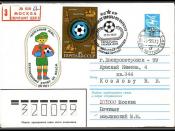Detente was a short period of time of improved relations between the United States and the Soviet Union between the 1960's and the 1970's. Detente is French for "relaxation". Although Detente was designed to end Cold War tension, it eventually became a "thawing out" period. Detente reached it's zenith with the Nuclear Nonproliferation Treaty of 1968, the SALT (Strategic Arms Limitation Treaty) of 1972 and the Helsinki Accords in 1975. Both the US and the USSR various had reasons to seek Detente.
The Cuban Missile Crisis, that started October 18 1962 and lasted until the 29, made everyone uneasy. There was fear that a Third World War would break out if tensions did not improve. Nuclear weapons became a big concern; by 1969 the Soviet Union had matched the United States in their number of nuclear weapons. A state of mutually assured destruction (M.A.D) had obviously been reached.
Mutually assured destruction meant that even if the Soviet Union attacked America with nukes, American would be capable to attack back and there would be no winners. People around the world feared a nuclear holocaust. While Dwight Eisenhower was president, the ideas of brinkmanship and massive retaliation were adopted. Both the US and the USSR believed that the more nuclear weapons a country had the stronger chance they stood. Massive retaliation meant that if the US was attacked by the USSR that they would use all available resources (mainly nuclear weapons) to destroy them. The military term "brinkmanship" means: "unions that threaten to strike and spouses that threaten divorce can also be involved in games of brinkmanship." Both the United States and the USSR were aware that if one of them attacked the other, it would be obliterate both countries. They both used a "second-strike" capability that made it...


